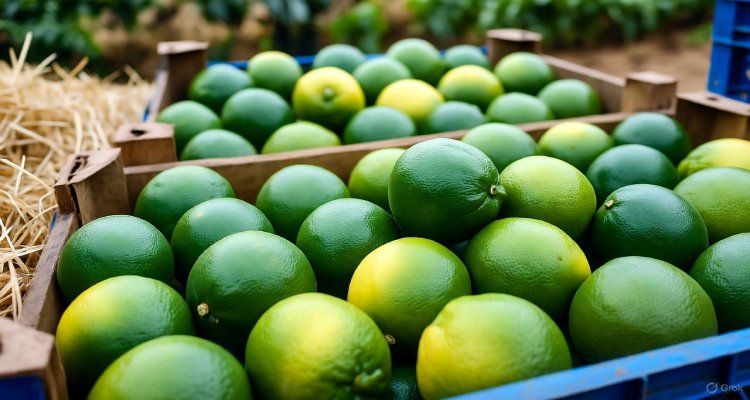APEDA Facilitates Exports of GI-Tagged Indi and Puliyankudi Lime to UK

India’s APEDA facilitates the first-ever export of GI-tagged Indi and Puliyankudi limes to the UK, marking a major boost for Indian farmers and horticultural exports.
India’s global agricultural footprint just turned more fragrant and zesty. In a landmark move for the country’s horticultural exports, the Agricultural and Processed Food Products Export Development Authority (APEDA) successfully facilitated the first-ever air shipment of Geographical Indication (GI)-tagged Indi lime from Karnataka and Puliyankudi lime from Tamil Nadu to the United Kingdom on October 28, 2025.
This initiative not only celebrates India’s agricultural diversity but also reinforces the nation’s commitment to promoting region-specific produce in international markets.
A Historic Shipment from Southern India
The consignment comprised 500 kilograms of premium-quality limes: 350 kilograms of Indi lime cultivated in Karnataka’s Vijayapura district and 150 kilograms of Puliyankudi lime from Tamil Nadu’s Tenkasi district. The successful dispatch represents a convergence of tradition, quality, and modern export infrastructure — all under the guidance of APEDA, functioning under the Ministry of Commerce and Industry.
Officials confirmed that the produce was selected based on rigorous quality standards and post-harvest handling to ensure the fruits retained their freshness and juice yield during air transport to the UK. This moment marks the first time that these two distinct GI-tagged varieties have traveled beyond Indian borders together, showcasing the potential of regional branding as a driver of rural prosperity.
The Uniqueness of Indi Lime
Cultivated in the sun-soaked fields of Vijayapura, Indi lime has earned recognition for its tangy aroma, balanced acidity, and high juice content. Local farmers regard it as a symbol of the region’s agricultural excellence. This lime’s distinctive quality lies in its equilibrium between sourness and sweetness, making it suitable for both culinary use and traditional medicine.
Beyond taste, Indi lime carries social and cultural weight in Karnataka. Used in home remedies and festive rituals, the fruit mirrors the agrarian legacy of the Deccan Plateau. Its newfound GI-tagged identity elevates local growers to a more competitive position in the export economy, providing a safeguard against market imitation and enabling better price realization.
Puliyankudi: The Lemon City’s Pride
Puliyankudi in Tamil Nadu, often dubbed the “Lemon City,” is famed for its thriving citrus belt. Its lime, particularly the Kadayam variety, is characterized by an exceptionally thin peel, high ascorbic acid content measuring 34.3 mg per 100 g, and an impressive 55 percent juice yield. Rich in antioxidants and vitamin C, it has both nutritional and industrial appeal.
After receiving its GI tag in April 2025, the Puliyankudi lime officially joined the list of India’s protected agricultural products. Local cooperatives and farmer-producer organizations in Tenkasi district see the UK shipment as a gateway to new markets that value traceability, freshness, and sustainable sourcing.
APEDA’s Role in Transforming Agricultural Exports
Established in 1986 through a parliamentary act, APEDA operates as India’s apex body for the promotion and development of agricultural and processed food exports. Headquartered in New Delhi, the authority has 16 regional offices across India and oversees a diverse range of export categories, including fruits and vegetables, meat, dairy, bakery products, beverages, and floriculture.
Through initiatives like the Indi and Puliyankudi lime export, APEDA bridges local farmers and international buyers, ensuring that niche products with authentic origins gain the global recognition they deserve. It also coordinates with state agencies, exporters, and certification bodies to standardize packaging, logistics, and quality assurance in alignment with global market expectations.
According to a senior APEDA official, “The successful export of GI-tagged limes demonstrates India’s capacity to position local produce globally. Our goal is to create sustainable export channels where farmers directly benefit from premium branding.”
APEDA also functions as the Secretariat to the National Accreditation Board for accreditation under the National Programme for Organic Production (NPOP), reinforcing India’s standing in the organic and value-added segments of agri-trade.
Strengthening Farmer Incomes and Rural Economies
Exporting GI-tagged produce such as Indi and Puliyankudi limes ensures that growers receive higher margins due to their association with certified geographic origins and quality assurance. This move aligns with the government’s broader objective of doubling farmers’ income through value-based agriculture and market diversification.
By linking farmer-producer organizations (FPOs) directly to global supply chains, APEDA’s program minimizes the role of middlemen and enhances transparency. It also motivates regions across India to pursue GI registration for their unique crops — a strategy that not only preserves heritage but also multiplies revenue streams.
Farmers in Vijayapura and Tenkasi responded enthusiastically to the export. “For the first time, our limes are being recognized internationally by name,” said a farmer cooperative leader from Puliyankudi. “It brings pride and promise to our community.”
Implications for India’s Global Agri-Footprint
The entry of these GI-certified limes into the European market signals a broader trend: India’s growing emphasis on quality-driven agricultural exports over sheer volume. As consumers in Western markets increasingly prefer traceable, origin-certified produce, India’s GI products—from Alphonso mangoes to Darjeeling tea and now regional citrus—stand to occupy premium niches.
Analysts note that horticultural diversification and branding can significantly strengthen India’s rural export portfolio, especially when paired with climate-adaptive cultivation practices. The lime export success could pave the way for similar initiatives involving pomegranates, bananas, and other tropical fruits in the near future.
Looking Ahead
As the first shipment garners positive reception in the UK, exporters and farmers alike are optimistic about scaling production and expanding to European and Middle Eastern markets. With APEDA’s continuous involvement in certification, logistics, and trade facilitation, the fruits of local innovation are now reaching global tables.
The Indi and Puliyankudi lime export is more than a trade milestone—it is a celebration of India’s biodiversity, its farmers’ resilience, and the power of geographical identity in shaping sustainable economic progress.
Disclaimer: This article is based on publicly available information from APEDA and government reports. It is intended for educational and journalistic purposes and does not constitute official trade advice.










